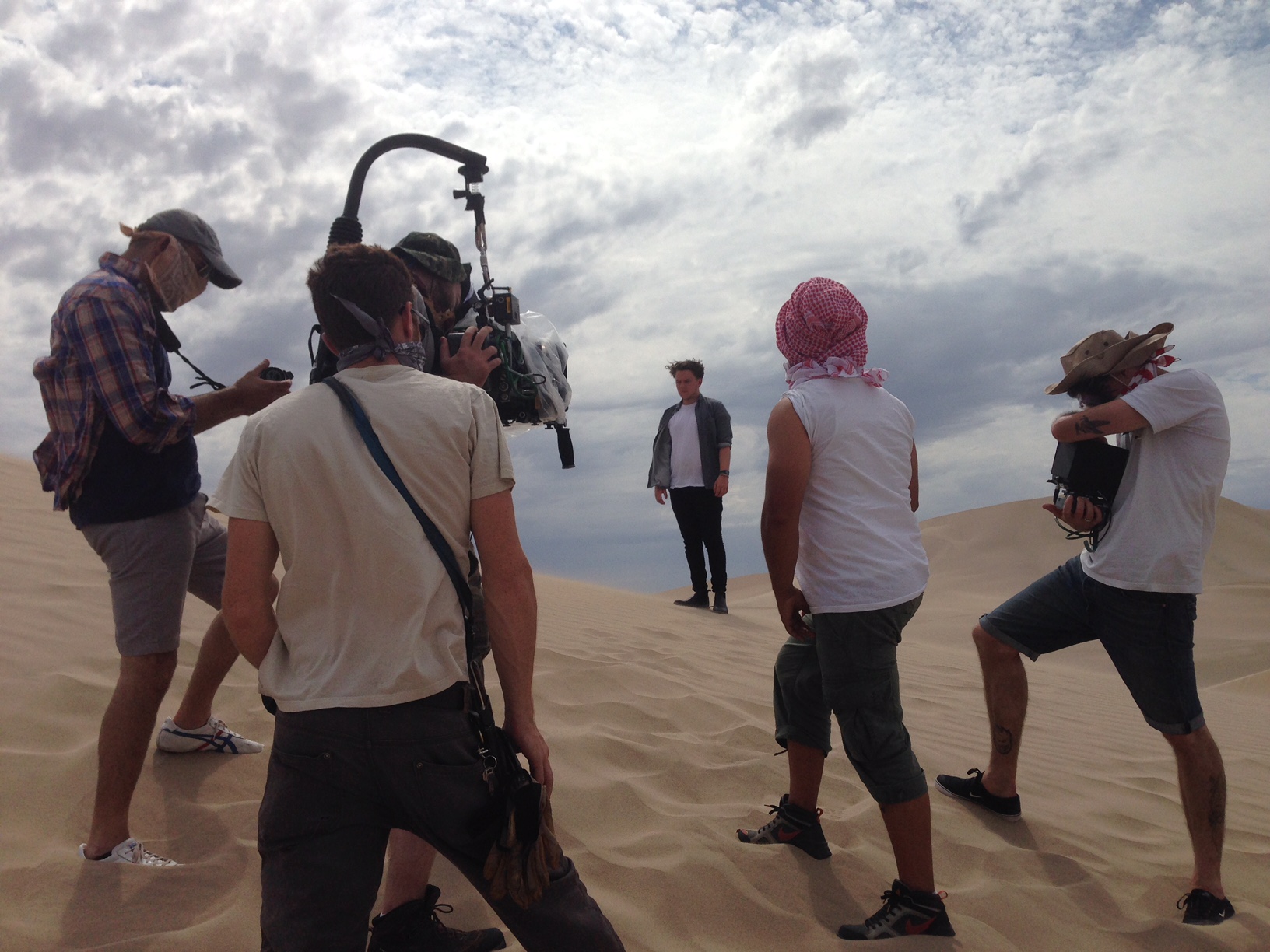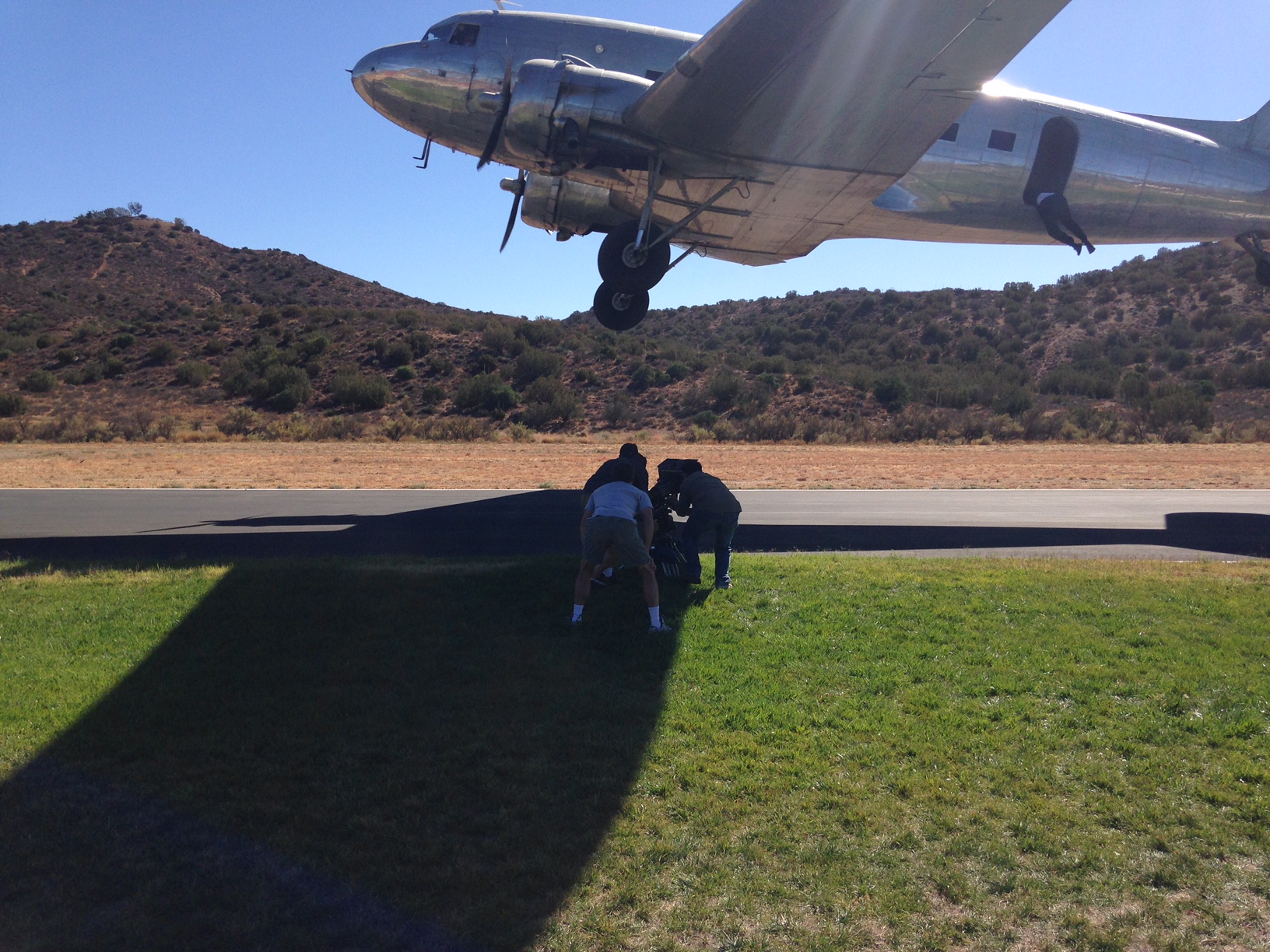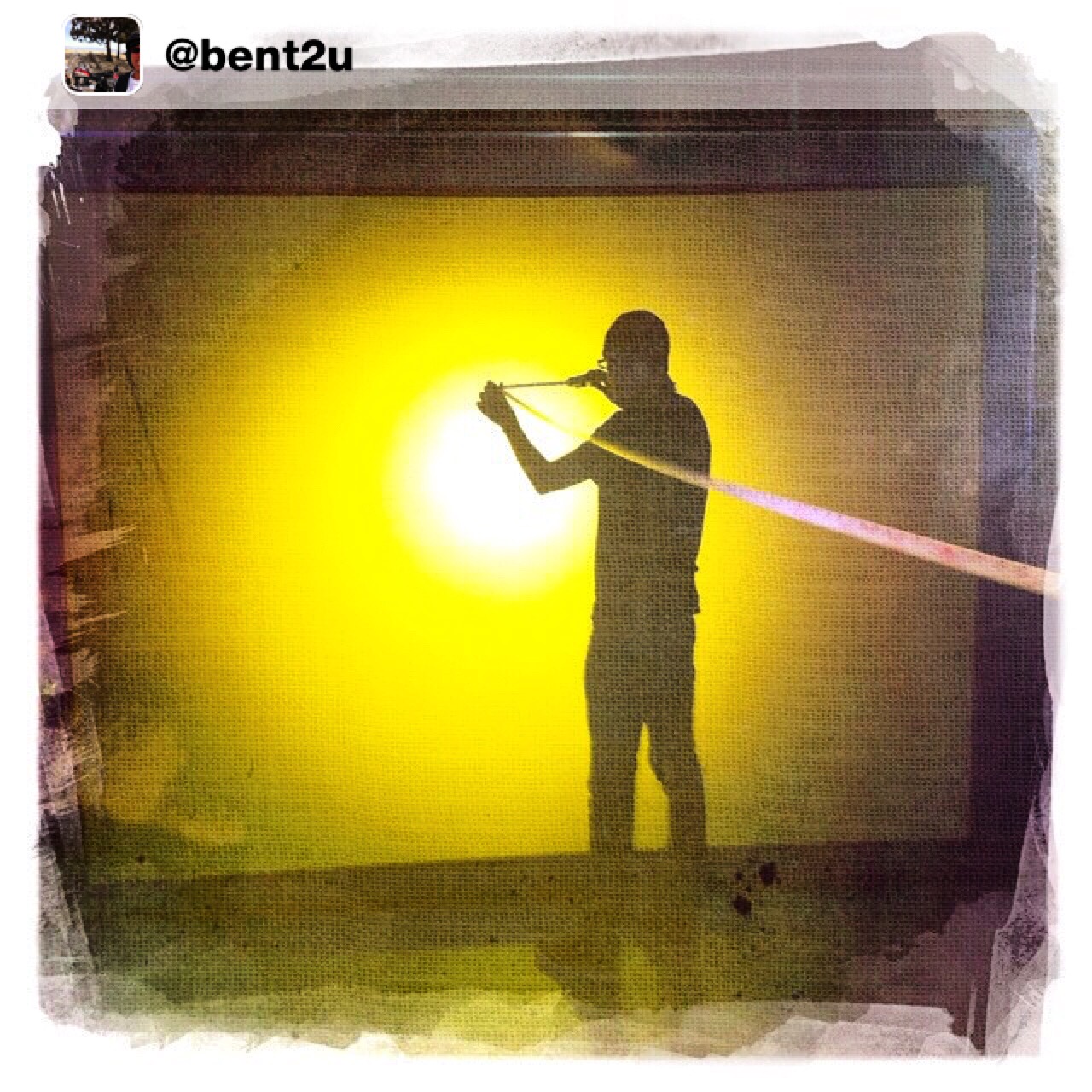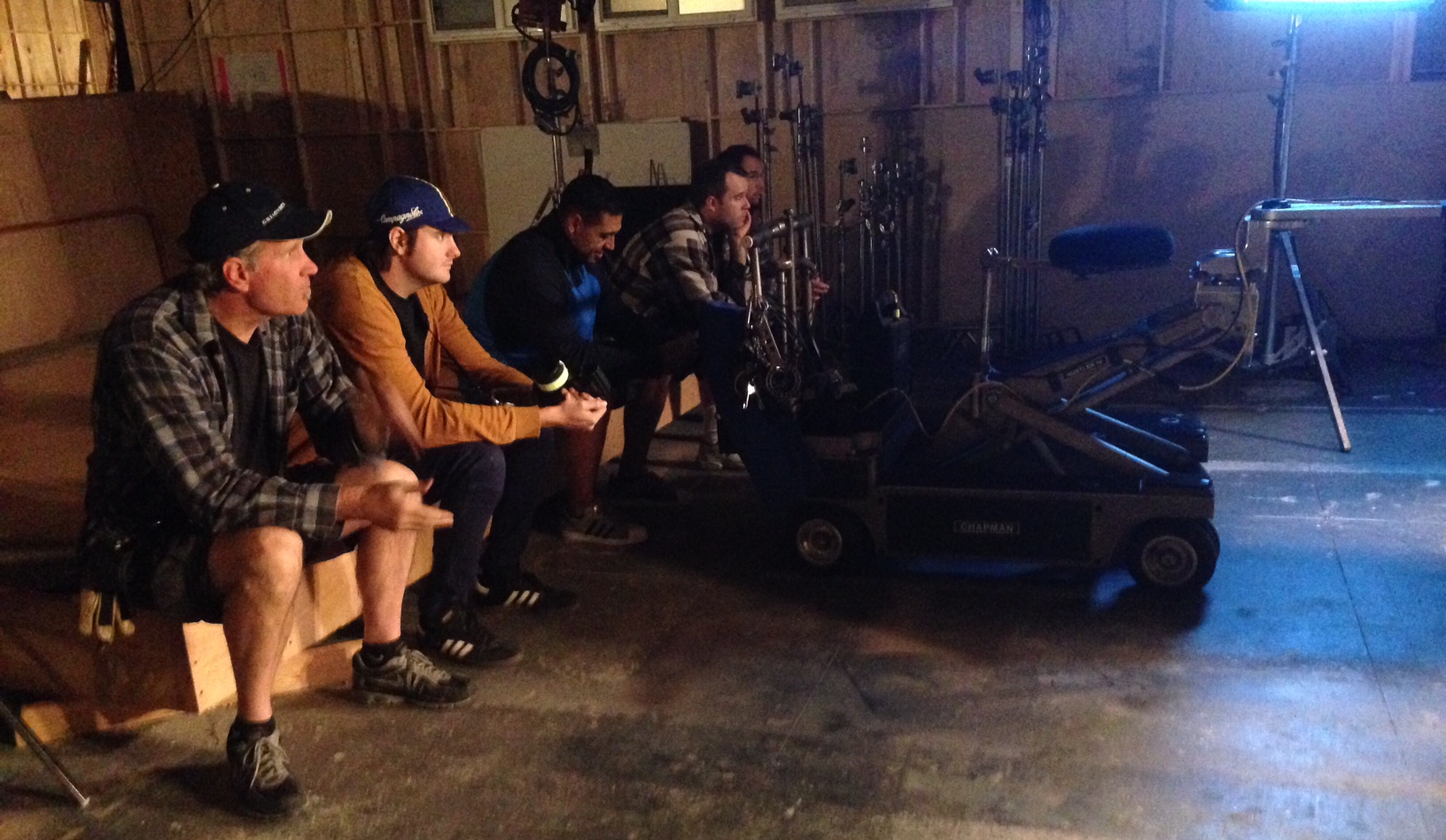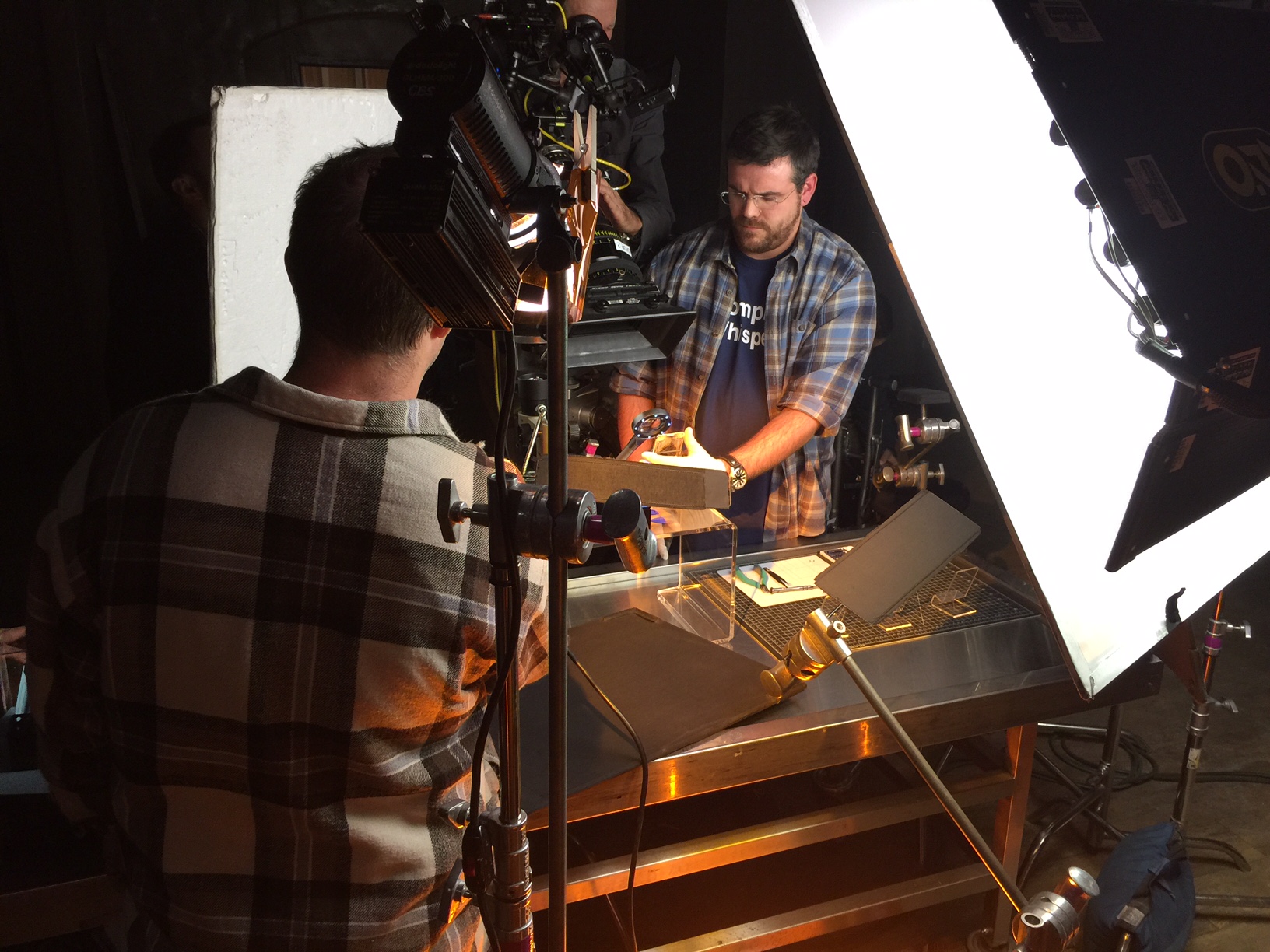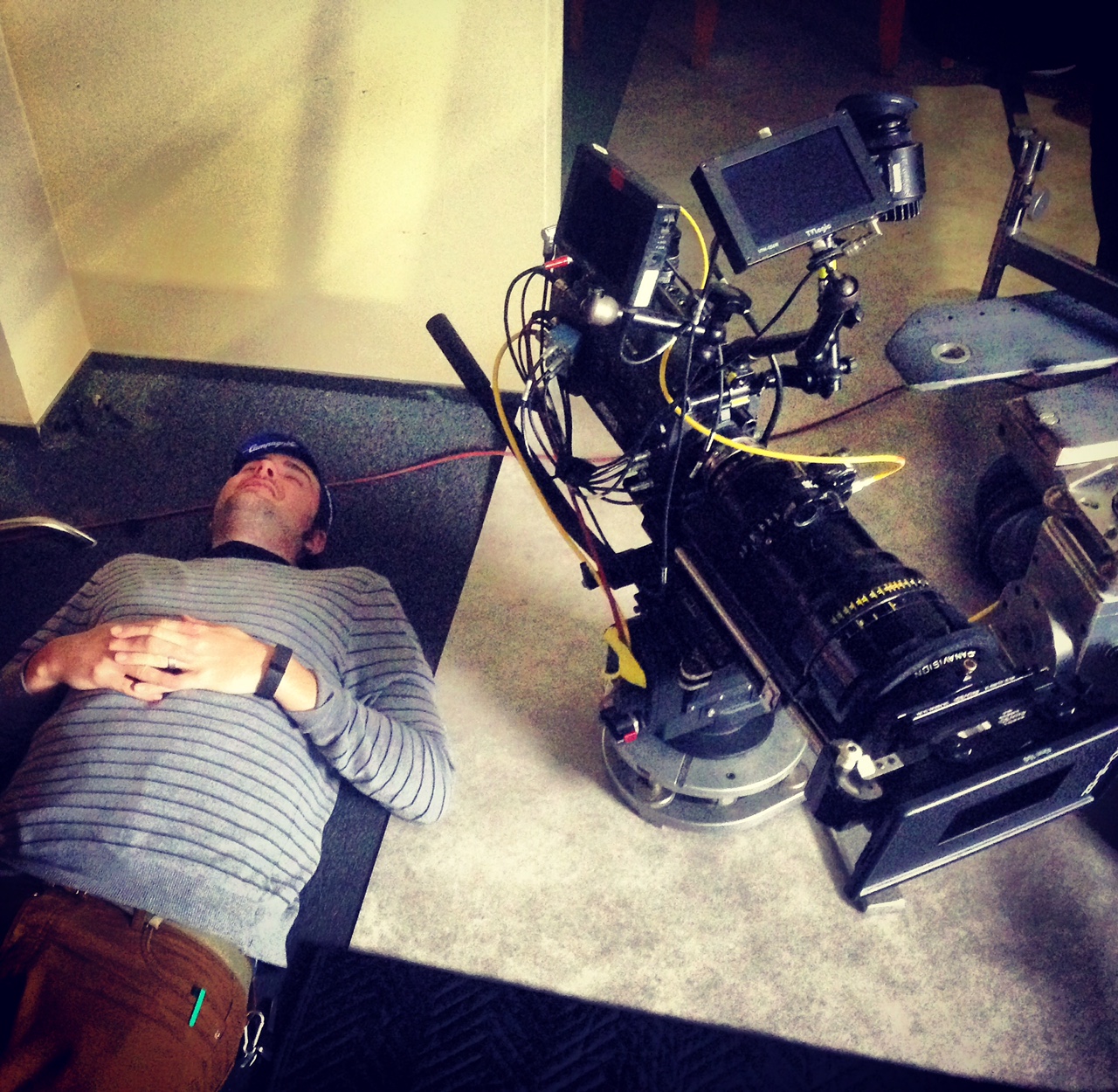Hello ladies and gentlemen, Muldoon here with an exciting look behind the scenes, a straightforward Q&A with an experienced Assistant Camera, Colin Kelly. When I have the opportunity to pick the brain of an individual who makes a living doing what they love while bringing us all a little bit of escapism - I can't help but jump at the opportunity. MEET THE CREW at its core is simply about film appreciation, about pulling that small thread of "huh, I wonder how they did that." or "What the hell is a Gaffer?" and seeing where that goes. I ask the questions I want to know myself in hopes of getting answers that are a little more informative rather than... well the alternative. On any given film, from the 200 million dollar blockbusters down to the (truly) zero budget film, there are duties that need to be done in order to tell a given story. Men and women bust their asses to bring us all something to watch, to enjoy, to learn from, and passively experience. Today we gain a little insight into the Camera Department with a man who has worked on all sorts of great projects, like CAPTAIN AMERICA, GODZILLA, BONES, CSI, and more... The man's been at it for the last fifteen years, so it's a real treat to get a little of his perspective here today. I truly appreciate Colin taking the time to share his experiences with me and the rest of the AICN world. I'm always curious to talk with passionate people in this industry, so if you work in film/TV yourself and feel like chatting - please do reach out to me at Mike@aintitcool.com. I've got a handful of new MEET THE CREW articles in the works, but am always down to talk (I've yet to have a Production Assistant for example). In the mean time, let's jump on into the head of a Camera Assistant, a Mr. Colin Kelly's!
COLIN KELLY - ASSISTANT CAMERA
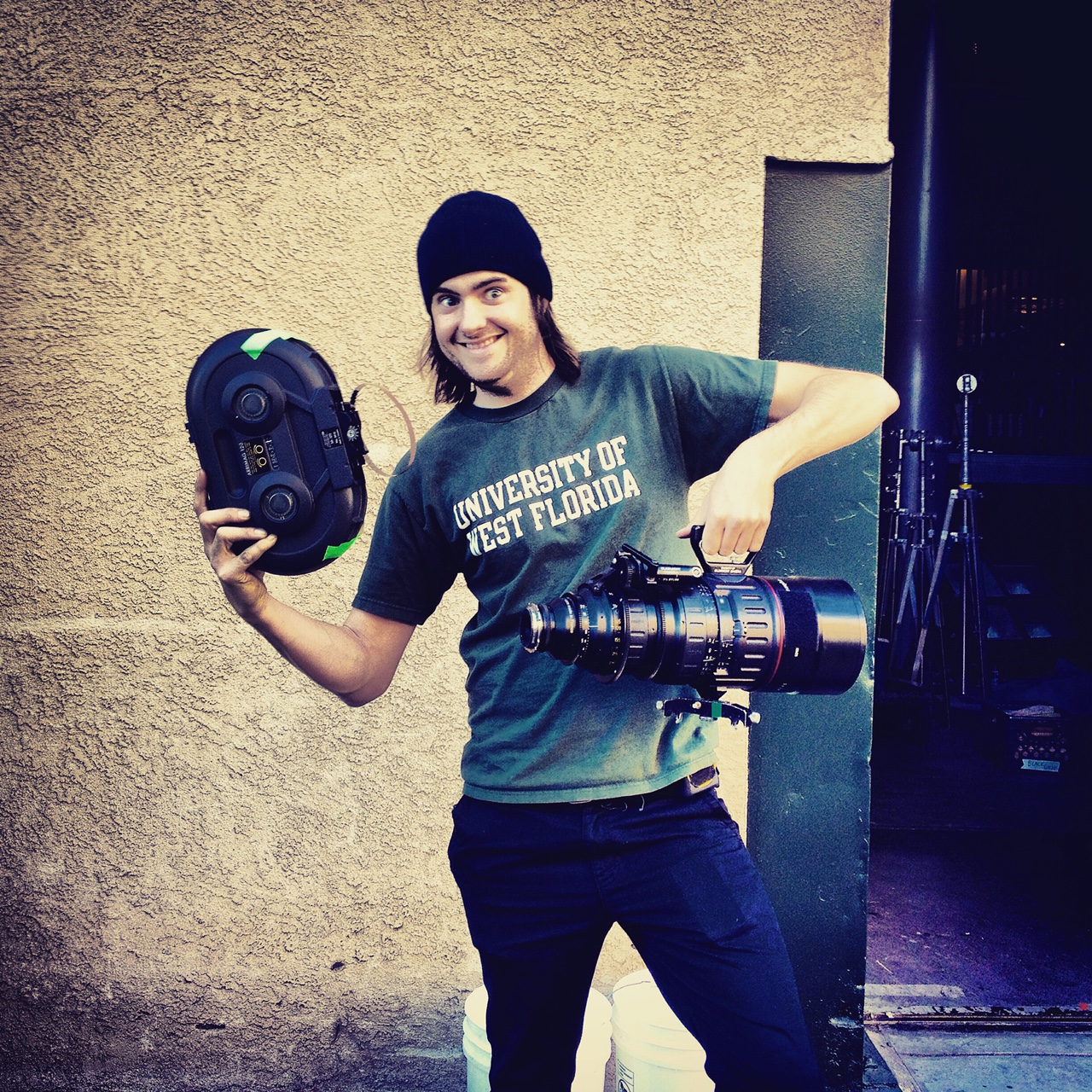
What are the duties of the AC?
The 1st ACs job is to maintain the camera and to have the ability to be able to accomplish the kind of shots called for. This includes having the right equipment to position and operate the camera in the way needed and to have the camera ready to function as required. They make sure the camera is set to the right shutter, aperture, fps, distance, and with digital cameras, color temperature and iso. Also during the shot it’s their job to make sure a certain kind of depth of field is maintained. Three things factor here: lens size, f-stop, and distance. It’s their job to make sure the right stop is maintained and to adjust the lens as needed. Modern lens have rings that allow you to change the amount of light that enters, the distance that the lens will focus, and with zooms the size of the lens.
The 2nd ACs main duty is to assist the 1st AC. Duties include retrieving equipment like lens and transferring the equipment that was previously on the camera back to its proper case or “home.” After the camera is rolling, it’s their job to slate each scene showing information like roll, scene, and take numbers. They also maintain camera reports noting things like the above information in addition to lens size or more camera notes depending on the show. Also depending if there is or isn't a utility or loader on the show it may be their job to coordinate with the transportation department about runs needed for the camera department. This includes things like swapping out equipment with the rental house or media runs to editor or color timer. Also they may have to maintain the paperwork of the show. This includes timecards, daily time sheets, and equipment records.
Who do you report to and when are you typically brought on?
A 2nd reports to A 1st. And the 1st to the operator and the director of photography. Many times a DoP will hire me but many times an operator or another 1st or a 2nd. This depends on the show. Full season you will get the call hopefully a few weeks before but know about it well in advance. Day playing gigs can be weeks, or happen that day. Day playing means coming in for a day or just as long as needed or whenever needed. Maybe there is an extra camera that day or someone got sick. I liken it to being a hired gun like in A Fistful of Dollars or Yojimbo.
What kind of hours do you work?
The joke is 12.1, meaning twelve hours and one click or at least one second after twelve hours . On shows with good contracts this means you get paid for the 13th hour as well which is double time pay. I support a policy of 12 on 12 off.
What path lead you to being an AC?
My Mom and I watched hundreds of films growing up. Classics like Back to the Future, Star Wars, Godfather, Batman, and Blade Runner were my first instruction in film. Although at the time I had no idea you could make a living from making movies. That world was about as foreign as it could be to me.
Did you go to college for film?
I went to the University of Texas at Austin and received a bachelor of science in radio, television, and film. I was always the kid who would load the film at school. After school I thought I would be a director like most coming out of film school, but after moving to Los Angeles I answered a craigslist ad looking for a 2nd AC/intern. I liked being close to the device that was impossible to shoot a film without.
If you had to pick another department in film, which department would that be and why?
Sound and be a utility. Early on in my career I did some boom work after meeting a great sound mixer named Dana Kopetzky. I got some height to me so booming seemed like a natural fit. Sound utilities are like guest boomers coming on set when a second boom is needed. They also mic the actors, handle the cable running from video village to the sound mixer, and do sound departments paperwork. These are all skills I have and just about every utility I have met has been a great person. Often sound and camera departments share a truck so I have been very fortunate to meet many great sound folks. You can get away with a soft focus shot but bad sound takes you right out of the experience of watching a show or movie.
Why do you do it?
What’s the part of the job that keeps you coming back for more? In other words, what’s the best part of your job? Film at its best is an amazing art form. Getting to make art with a group of your friends is the best way I can think of to make a living. Each day on set is a new adventure with new challenges. Being apart of the camera department means you are always apart of the action and right in the thick of it. We often say we aren't saving lives on set meaning filmmaking often gets taken way too seriously, but as crew members we often also have to remind ourselves like any art we are giving an emotional experience to the viewer, whether it be sadness, excitement, joy, fright, laughter, or any number of feelings. I know my work has brought at least one smile to someone's face.
Was there anyone in your past that helped get your career started?
A mentor or person who said, “Colin’s got what it takes – I’ll give him a shot.” I try to learn from everyone I meet but two people stand out in my mind. Tim Herman taught me how to be an AC. Himself not only a great AC, grip, electrician, musician, and writer, I met him on my second film in LA. He brought me on a few low budget shows to 2nd for him. He taught me what tools I needed and how to do my job. Film school was great for theory but all my true skills I learned on set and many from him. A second mentor I look to fondly is the one and only King of the Valley, Robert Gagnier. He has been ACing since 1979 and was instrumental in hiring me on the TV show CSI:NY. We often joked he had never left the San Fernando Valley living and working there his entire life. From him I learned what it meant to really be an AC and how to always do my job with a smile and the right attitude.
Of the projects you’ve been on, which three do you reflect fondly upon and why?
CSI:NY, I started day playing on the show season 2 and worked on the second unit on seasons 3 through 9. The crew was more than just that, they were a family. Working 12 hours a day with the same group of people means you see those people more than your friends or family so they become your family and friends. On that show I met my beautiful wife and two of my groomsmen for my wedding, the shows international publicist, our stand in/hand double, and our dolly grip respectively. Our coordinator introduced me to my future wife, herself being a bridesmaid in our wedding. No matter the long hours or other problems that occurred I will always look fondly back on that show. Sharing those kinds of experiences together is something I would never trade.
CSI:Cyber Season 2, After CSI:NY unfortunately got canceled I never thought I would be doing that kind of work again at the same stages with the same people ever again. Working a season on Cyber gave me another chance to enjoy that same kind of work with many of the same people. It was like a reunion tour that sadly only lasted one season but what a season it was. On the second unit of both shows we got to use a small crew to shoot the science of the show doing what are called inserts. They are close up shots used to tie together lines of dialogue with things the actors use or look at.
American Horror Story Season 1, Often in the film business you don’t get to work on shows that you enjoy watching or by working on a show it becomes ruined because you know the outcome. I am a big fan of the American Horror series and getting to work with the actors I so enjoyed seeing do their craft on the sets I loved was a major plus for me. I only day played for a few days on a few episodes which made me feel like I got to tour one of my favorite shows.
Can you describe your most difficult day on a shoot? I’m not looking for names, more for challenges – perhaps a day where equipment failed or you were given an unrealistic task?
Before I got into the union, any shoot day where I made more than 150 dollars was a good day to me. Although one shoot in particular stands out as being particularly tough. Shooting in the desert with anamorphic lens with multiple film stocks and various filters would be hard enough. The heat, the lack of water and craft service added to the struggle but the worst part was that the camera department composed of myself and my 2nd had no carts to cart around our equipment. We had to work out of cases and a pass van all the while battling dust storms. Threading film on a camera and dirt do not mix. Preparation for a shoot is sometimes overlooked but can often be the most important part. Knowing what and where you are shooting is essential to having the right equipment on hand.
Given you’ve worked on so many things, what are some crucial differences between what sets worked well and which ones were chaotic?
Focusing on the positive, what made those nicely run sets work, from your perspective? The best sets I have worked on are ones where each crew member knows their job and completes those tasks in a timely manner. Well run sets order come from the top down. The producers, directors, DoPs, and 1st Ads set the tempo for the entire crew. If one person in the chain of command doesn't know what they are doing or if they set up a chaotic environment everyone suffers. A set is like a very complicated dance with many dancers who each have their partners and moves. I have my job to do but I expect and trust every other member to do the same. Filmmaking can be very fun if it is allowed to be. It doesn’t have to be a stressful experience.
When thrown at a given scene, shot, or take – what questions do you need answered before you can do your best? Direction of light? Clouds? Lens type? Essentially, I’m curious about what thoughts/issues/details need to get figured out when the director or DP points and says, “put the camera there!”
On single camera shows the aforementioned single cameras are made up of four members, The operator, the 1st AC, the 2nd AC, and the often forgotten dolly grip, a liaison between camera and grip departments, who is essentially a camera operator as well. The dolly grip will bring the camera and line up the dolly in the general direction of the shot. They maneuver the dolly into the right position while also controlling the height of the camera. This will happen before the shot and sometimes during. Take a master shot for example. These are usually wide shots that show the entire geography of a scene including all the actors and set. The operator will communicate to the dolly grip how he/she wants the dolly positioned. Does it need to be on track, dance floor, is this shot handheld? The operator will also many times tell the 1st what lens needs to be on the camera. Sometimes this call will come from the DoP or the director as well. On these kind of shots lens below 50mm are typically used. Once the lens is on, the camera setting are decided, and the camera positioning is worked out the 1st AC will get their marks. On a wide master you may pull out a soft tape measurer to get a general idea of distance but more likely you will get an eye focus on a monitor. Wide shots have greater depth of field which works in your favor because little focus adjustment is usually needed. After typically having a rehearsal the camera should be ready to roll. And in the great words of the great Raymond Stella, the operator should, “Keep ‘em in the fucking frame.”
What film or show can point to and say “I made that better” or “that shot is like that because of me!”
I can point to many shots on CSI:NY used during the show and sometimes used during the show’s opening that I greatly influenced. On the second unit many times I would load the film in magazines and next thread the film onto the camera. My hands were some of the very few to touch the film negative. Also it was my duty to make sure the shots were in focus. Close up shots especially those shot on macro lens or at the end of a zoom have very low depth of field. It was my job to make sure the right part of the frame was in focus meaning the right information is given to the audience. Plus the show’s style meant we often had the honor to shoot the investigation part of crime scene investigation.
What advice can you give anyone out in the AICN audience who wants to be an AC? What are some things you wish you had known going in?
I often wished my film school experience was more technical in nature. Being an AC means knowing the camera you are using. Other than books about the subject or manuals about cameras, going to or working at a camera rental house can prove to be a possible avenue into the business. Unfortunately it isn't about the information you know it is who you know. Getting one foot in the door means someone must be willing to give you a chance. I worked for free to learn my craft. Many times breaking into the film business means working as a PA. I would recommend talking to the AC’s on any shoot you are fortunate to get on. They might be able to teach you a thing or two or be a contact in the future.
What advice can you give to the writers, producers, and directors out there to get the most from their Camera Departments – or – what are some things they could do to get the most out of Camera?
There are so many different camera systems and support items out there that anything is possible. A job of an AC or a camera person in general should never be to say no we can’t do something; it should be let’s figure out how to get the shot you need. A writer, director, or producer should never be hamstrung by thinking something they dream up can’t be accomplished. If given the right time and right equipment no shot is impossible.
What are you doing next? Do you have any projects of your own that you’re working on?
I just finished working on a ten episode three month TV show. Other than taking some well needed time off I will be back to day playing on various TV shows and other formats. Day playing allows me to choose my schedule and to be able schedule time for my own projects. In the old days one would work up the chain of command by first being a loader, then a 2nd, then 1st, then operator, and finally a DoP. Things don't necessarily work that way anymore. In the film business content is king. If you want to make moves you have to have a product that somebody wants to buy whether it be your own film or script. For me I am trying to publish my first novel. I hope one day it will be made into a TV show.
There we have it, ladies and gentlement - a fun bit of insight from an Assistant Camera. As always, I truly do appreciate Kelly's dip into details as this column is only as interesting as it's subjects care to go. Colin took the time to truly give us/me some perspective, which is invaluable and really cool of him. Hopefully the next time you see "Assistant Camera" in the credits of your favortie film or TV show you'll have a better understanding as to what that person did to bring that story to life!
If you work in film or television and feel like shedding some light on what exactly your position entails, then please feel free to shoot me an email with the subject line "MTC - (Your Name) - (Your Position)." I'm not here to get scoops or dirt on anyone, simply here to educate and ask for advice to any of our filmmakers in the audience.
If you folks are interested in finding out what other positions on a film are like, then check out any of the links below:
Robby Baumgartner - Director of Photography
Thomas S. Hammock - Production Designer
Seamus Tierney - Cinematographer
Brian McQuery - 1st Assistant Director
Shannon Shea - Creature/VFX Supervisor
Christopher A. Nelson - Special Makeup Effects Artist
William Greenfield - Unit Production Manager
Jeff Errico - Storyboard Artist
Monique Champagne - Set Decorator
Arthur Tarnowski - Film Editor
Justin Lubin - Stills Photographer
Jason Bonnell - Location Manager
Jakob Trollback - Title Designer
Welch Lambeth - Transportation Coordinator
Dennis Muren - Visual Effects Supervisor
- Mike McCutchen
"Muldoon"
Mike@aintitcool.com
![]()

